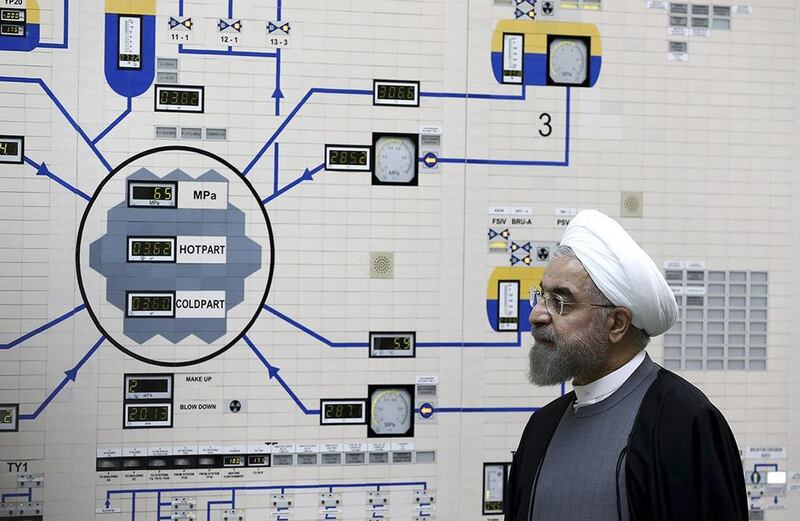Benjamin Netanyahu’s reelection campaign features a TV ad in which he arrives at the door of a couple who have booked a babysitter. Why has the prime minister of Israel come to their home, they ask. “I’m the Bibi- sitter,” Mr Netanyahu says, in a play on his nickname.
The Bibi-sitter came to Capitol Hill last week, addressing politicians in the cadences of a man telling a scary story to young children, all repetitions, dramatic pauses, stage whispers and dramatic flourishes. It was a tone and style he’d never dare adopt in the Knesset, where it would invite ridicule.
The Obama administration remains unmoved, however, by Mr Netanyahu’s claim that the nuclear agreement being negotiated between world powers and Iran will see Tehran race to build nuclear weapons in order to destroy Israel.
The international consensus holds that Tehran hasn’t actually decided to use its civilian nuclear infrastructure to pursue weapons and the current deal strengthens safeguards against it doing so.
Moreover, former defence minister Ehud Barak has publicly rejected the idea that a nuclear-armed Iran would launch a suicide attack on Israel – whose estimated 200 nuclear warheads could obliterate Iran’s cities.
The US intelligence community has told Congress that Iran’s decisions over nuclear weapons are guided by its priority to ensure the survival of its regime, and will be determined by the extent to which its leaders believe they face external threats on a scale that requires a nuclear deterrent. Iran’s calculations can therefore be changed by the actions taken by the international community.
Nor does the Obama administration accept Mr Netanyahu’s claim that tearing up the current deal will lead to a better one.
More probably, it would see the likes of Russia and China abandon the sanctions regime, allowing Iran to break out of the economic chokehold without having a new nuclear agreement in place.
Still, there’s no question that Iran has vastly expanded its regional influence in the decade since the US invasion of Iraq. US secretary of state John Kerry snarkily reminded Congress that Mr Netanyahu’s had assured it in 2002 that a US invasion of Iraq “will have enormous positive reverberations on the region”.
Iran has been the most influential foreign player in Iraq since 2005, when the first democratic elections were held under the US-led occupation. That election, and every one since, has resulted in governments closer to Tehran than any other regional power or, indeed, to Washington.
Nor should there be any surprise in Tehran doing whatever it could to ensure a friendly government in Baghdad: Iran lost hundreds of thousands of its citizens in the longest conventional war of the 20th century, after Saddam Hussein’s regime invaded the Islamic Republic in 1980.
Tehran maintained the close ties it cultivated with Iraq’s key Shiite political players during their years in exile, and with the militias who may constitute a more capable military force in the ground war against ISIL than the US-trained Iraqi National Army.
But those same militias have also engaged in vicious campaigns of sectarian retribution and ethnic cleansing against Sunni communities, which has raised legitimate concerns that their central role in the fight to push back ISIL forces from Tikrit, Mosul and other cities will result in further sectarian killing – and deepen the alienation of Sunni Iraqis from Baghdad, which will assist ISIL.
Elsewhere, Iran continues to prop up Bashar Al Assad’s regime, in coordination with its Hizbollah allies. And its Houthi allies in Yemen have taken control of the capital.
So the regional Cold War that pits camps led by Saudi Arabia and Iran against one another has heated up since the US withdrew from Iraq and began retrenching its long-time “sheriff” role. But it’s worth remembering the US intelligence assessment that Iran is a pragmatic power that makes decisions based on a cost-benefit analysis, and whose primary concern is the survival of its regime.
Its nuclear work – creating infrastructure permissible under the Non-Proliferaiton Treaty but which can be repurposed for building nuclear weapons – has brought sanctions, but it has also brought world powers to the table and compelled the US to effectively recognise the regime, and open a pathway to diplomatic engagement.
The two countries are unlikely to settle their differences, but diplomacy offers the potentially to manage those differences to everyone’s benefit.
While the proposed deal contains Iran’s nuclear programme and strengthens safeguards against materials being turned into weapons, the challenge will be to find a new security framework that can contain the strategic conflict of which the nuclear issue is a symptom rather than the cause.
Iran clearly knows there are other issues to settle: in 2003, it reached out to the Bush administration with a “Grand Bargain” offer to negotiate terms not only for settling the nuclear dispute, but also to address US concerns over Iran’s role in Iraq, Lebanon and even towards Israel.
The US refused to even respond to that offer, believing perhaps that its victory in Iraq had intimidated Iran. That’s not how things turned out.
But the nuclear deal certainly establishes a basis from which Washington and Tehran may open the way to a conversation over a wider regional security agenda, and to address regional concerns over Iran’s role. As in the nuclear talks, however, such a conversation would require a measure of compromise and mutual recognition of the security interests of states currently at loggerheads.
Tony Karon teaches in the graduate programme at the New School in New York





